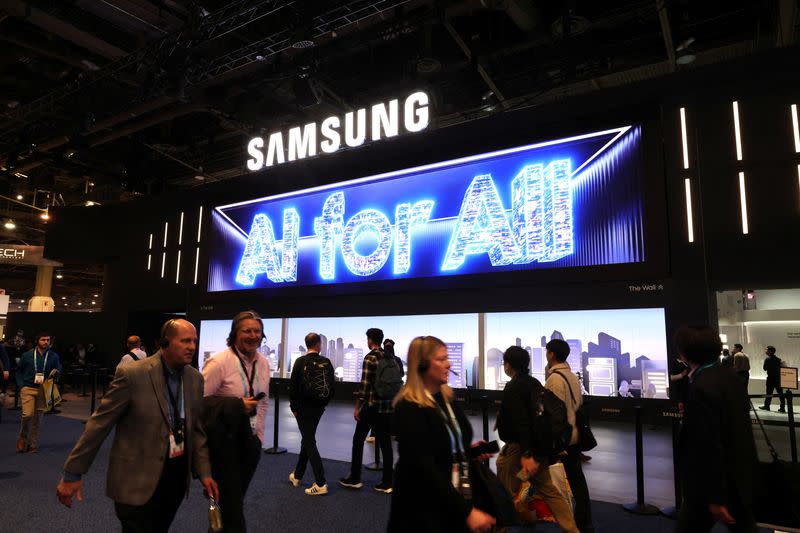Exclusive-Samsung to use tech favoured by SK Hynix as AI chip making race heats up, sources say

By Heekyong Yang
SEOUL (Reuters) -Samsung Electronics plans to use a chip making technology championed by rival SK Hynix, five people said, as the world's top memory chipmaker seeks to catch up in the race to produce high-end chips used to power artificial intelligence.
The demand for high bandwidth memory (HBM) chips has boomed with the growing popularity of generative AI. But Samsung, unlike peers SK Hynix and Micron Technology, has been conspicuous by its absence in any dealmaking with AI chip leader Nvidia to supply latest HBM chips.
One of the reasons Samsung has fallen behind is its decision to stick with chip making technology called non-conductive film (NCF) that causes some production issues, while Hynix switched to the mass reflow molded underfill (MR-MUF) method to address NCF's weakness, according to analysts and industry watchers.
Samsung, however, has recently issued purchase orders for chipmaking equipment designed to handle MUF technique, three sources with direct knowledge of the matter said.
"Samsung had to do something to ramp up its HBM (production) yields ... adopting MUF technique is a little bit of swallow-your-pride type thing for Samsung, because it ended up following the technique first used by SK Hynix," one of the sources said.
Samsung said its NCF technology is an "optimal solution" for HBM products and would be used in its new HBM3E chips. "We are carrying out our HBM3E product business as planned," Samsung said in response to Reuters' questions on the article.
After the article was published, Samsung issued a statement saying "rumours that Samsung will apply MR-MUF to its HBM production are not true".
The HBM3 and HBM3E are the newest versions of high bandwidth memory chips that are bundled with core microprocessor chips to help process vast amounts of data in generative AI.
Samsung's HBM3 chip production yields stand at about 10-20%, lagging SK Hynix that has secured about 60-70% yield rates for its HBM3 production, according to several analysts.
Samsung refuted the estimated production yields and said it had secured a "stable yield rate" without elaborating.
According to one of the sources, Samsung is already in talks with material manufacturers, including Japan's Nagase, to source MUF materials. But mass production of the high-end chips using MUF is unlikely to be ready until next year at the earliest, as Samsung needs to run more tests, the person added.
The three sources, mentioned above, said Samsung plans to use both NCF and MUF techniques for its latest HBM chip.
All sources spoke on condition of anonymity as the information is not public.
Nvidia and Nagase declined to comment.
Any move by Samsung to use MUF would underscore the growing pressure it faces in the AI chip race, with the HBM chip market, according to research firm TrendForce, expected to more than double this year to nearly $9 billion amid AI-related demand.
NCF VERSUS MUF
The non-conductive film chip manufacturing technology has been widely used by chipmakers to stack multiple layers of chips in a compact high bandwidth memory chipset, as using thermally compressed thin film helps minimise space between stacked chips.
But there are often problems linked to adhesive materials as manufacturing gets complicated as more layers are added. Samsung says its latest HBM3E chip has 12 chip layers. Chipmakers have been looking for alternatives to address such weaknesses.
SK Hynix successfully switched to the mass reflow molded underfill technique ahead of others, becoming the first vendor to supply HBM3 chips to Nvidia.
SK Hynix's market share in HBM3 and more advanced HBM products for Nvidia is estimated at above 80% this year, according to Jeff Kim, an analyst at KB Securities.
Micron joined the high bandwidth memory chip race last month, announcing that its latest HBM3E chip will be adopted by Nvidia to power the latter's H200 Tensor chips which will begin shipping in the second quarter.
Samsung's HBM3 series have not yet passed Nvidia's qualification for supply deals, according to one of the four sources and another person with knowledge of the discussion.
Its setback in the AI chip race has also been noticed by investors, with its shares falling 6% this year, lagging SK Hynix and Micron which are up 16% and 14%, respectively.
On Wednesday, SK Hynix shares closed down 1.3%, while Samsung rose 1%, beating a 0.4% rise in the broader market.
(Reporting by Heekyong Yang, Joyce Lee in Seoul, Fanny Potkin in Singapore, Sam Nussey in Tokyo and Max Cherney in San Francisco; Editing by Miyoung Kim and Himani Sarkar)

 Yahoo Finance
Yahoo Finance 